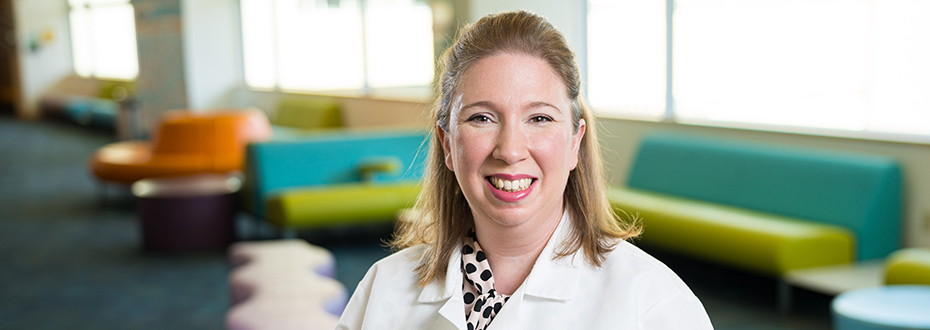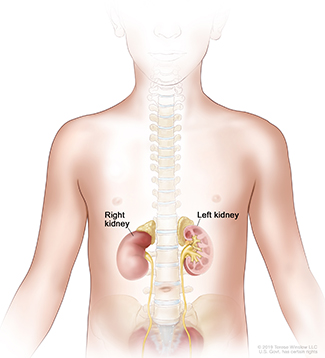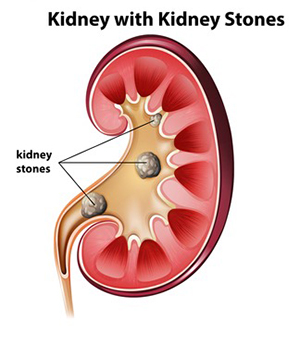Pediatric Kidney Stones

OHSU Doernbecher Children’s Hospital provides team-based care for children and teens with kidney stones. You’ll find:
- Oregon’s only pediatric kidney stone clinic.
- A team of specialists.
- Doctors who specialize in treating pediatric kidney conditions.
- The latest minimally invasive treatment options, including robotic-assisted surgery.
Understanding kidney stones
Our Metabolic Stone Clinic offers comprehensive prevention, diagnosis and treatment of kidney stones in children. Our kidney specialists and radiologists (imaging experts) treat 100 to 200 patients a year.
What do the kidneys do?
The kidneys are two fist-size organs just below the rib cage that:
- Filter waste and pass it as urine.
- Regulate minerals in the blood.
- Keep fluids in the body balanced.
- Produce hormones important to red blood cells, blood pressure and bone health.
Kidney anatomy

What are kidney stones?

A kidney stone is a piece of solid material that forms in the kidney. This happens when minerals in urine get concentrated and form crystals. Small stones often pass through the body with little discomfort. Larger stones can be painful and may block the urinary tract.
Risk factors include:
- Genetics
- Diet, such as taking in a lot of sodium or red meat
- Not drinking enough water
- Urinary tract infections or defects
- Certain metabolic disorders
Who gets them: Kidney stones are uncommon in children. However, many doctors report seeing more children with the condition in recent years. The causes are unclear but may be linked to increased obesity rates and higher-sodium diets.
Signs and symptoms of kidney stones
Children with kidney stones may have:
- Pain when urinating
- Blood in their urine
- Pain in the back, side or lower belly
- Nausea and vomiting
Diagnosing kidney stones
- Urine tests can detect infections or high levels of substances that form stones.
- Blood tests can help find high levels of calcium and uric acid that may lead to kidney stones.
- Imaging tests may include:
- Ultrasound, which uses sound waves to make internal images.
- CT scan (computerized tomography), which combines X-rays and computer technology to make 3D images of the urinary tract.
- X-rays.
Treating kidney stones
Treatment depends on symptoms and the size of the stones. For small stones, your child may need only to drink extra fluids and take pain medication.
For stones that are larger or blocking urine flow, we offer the latest minimally invasive options. These result in less pain and faster recovery than more traditional surgery. Your child will be sedated.
- Extracorporeal shock wave lithotripsy (ESWL): A machine delivers shock waves through the body to break the stone into small pieces that can pass in urine.
- Ureteroscopy: Doctors insert a thin, flexible tube with a camera and tools at the tip through the urethra. They can remove small stones or use a laser to break up larger ones.
- Percutaneous nephrolithotomy: Doctors insert a tube with tools through a small back incision. We are experts in this robotic-assisted option. It may be used if your child has large or complex kidney stones, or if your child has had a kidney transplant.
Preventing new kidney stones
Children usually recover quickly from kidney stones. Next we focus on preventing their return. Steps include:
- Have your child drink plenty of fluids, especially water. This keeps urine diluted and flushes out substances that may form stones.
- We’ll ask you to collect your child’s urine over 24 hours. We’ll study it for mineral abnormalities.
- If we’ve removed a stone, we’ll test its chemical makeup to help prevent future stones.
- When a cause can be identified, or if your child has repeated kidney stones, we may recommend medications and diet changes.
Learn more
- 6 Easy Ways to Prevent Kidney Stones, National Kidney Foundation
- Kidney Stones in Children, National Institute of Diabetes and Digestive and Kidney Diseases
Locations
Parking is free for patients and their visitors.
Doernbecher Children’s Hospital
700 S.W. Campus Drive
Portland, OR 97239
Map and directions
We also offer locations in Eugene and Salem.
Refer a patient
- Refer your patient to Doernbecher.
- Call 503-346-0644 to seek provider-to-provider advice.